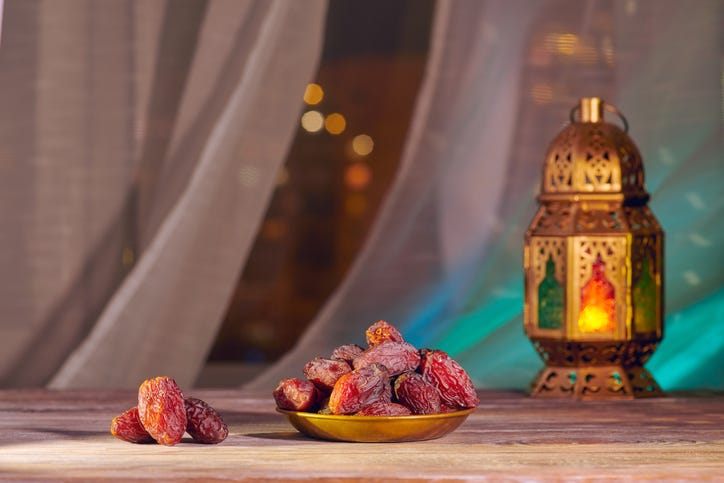“Even water?”
That’s probably the most common question I get from people who’ve never fasted Ramadan, the holy Muslim lunar month, whiched ended on Sunday. Over the course of the month, healthy, adult Muslims forgo food or drink — yes, even water — from dawn through sunset every day. Ramadan ended on Sunday, giving me a bit of time to reflect on the month.
Of course, forgoing food and water are the most obvious manifestations of fasting. But there’s a lot more to it. In the Qur’anic verses that prescribe fasting, the objective of fasting is clearly stated: “so that you may attain taqwa.” Taqwa is one of those words with such a rich diversity of meaning that it’s hard to accurately translate, but the closest definition is some combination of awareness of God’s strength and security in God’s provisions. Fasting from food and water are the bare minimum; Muslims also try to avoid consuming any and all things that distract from the centering objective of the fast, while maximizing those activities that remind us of the divine.
For me, the hardest part of Ramadan isn’t food or water, but caffeine and sleep. I love coffee. So I drink an unnatural amount of caffeine. When you can’t eat after 5:20 a.m. … and won’t eat again until 8:30 p.m., when do you caffeinate? I’ve resorted to slow release caffeine pills just before the fast begins, and breaking fast on the cold brew I would have had at 7 a.m. and 1 p.m. had I not fasted. But then the question becomes how do you sleep when you’re caffeinating at 8:30 p.m. and 5:20 a.m.? You see the quandary.
Though that means I spend a lot of my Ramadan in sleepless caffeine withdrawal — and the haze that accompanies it — I am always grateful for the experience.
The best metaphor I have is running a marathon. Rarely do you find runners at mile 23 who tell you that they’re loving their experience. They’re in pain. They’re grinding it out. They’re just trying to get to the finish line … and yet after the marathon is over, there’s an ineffable, almost spiritual experience that they speak of: they’ve challenged themselves, dug deep, and gained an insight at the boundary’s edge of existence.
For me, fasting is that kind of an experience. The struggle is the point. There’s a reason fasting is a nearly universal practice across ancient faith traditions — Judaism, Christianity, Buddhism, Hinduism and others. The reflective space it offers is profound, which is why I’m sharing this with you.
One of the most overwhelming observations is how deeply privileged I am not to have to feel this combination of hunger, thirst, and sleeplessness as a matter of the regular circumstances of my life. There’s a reason that Ramadan is, by far, the most charitable season for Muslims around the world.
The second is the remarkable reminder that, in fact, I don’t have to consume everything that’s in front of me. Indeed, I have agency in my consumption choices. We live in an economic culture that hinges on maximizing our capacity to consume, but never bothers to ask whether or not consumption itself ought to be an aim of life.
Radical nonconsumption emerges as a unique form of power. I find that cravings — for anything — start to disintegrate. And the things I do choose to consume are that much more enjoyable. That first sip of coffee every evening is … delectable. I also find that the hooks that corporations have manufactured into processed foods and drinks aren’t simply ineffective, they’re off-putting. I’m going to admit something here: Takis and HARIBO Happy-Colas are my kryptonite. But I had a Taki last week, and the minute my parotid salivary glands — the ones that tingle on your jaw when you eat sour foods — fired, I almost had to spit it out.
The irony is that in forgoing food and water, sleep and caffeine empowers. But this year, I’ve taken it a step further. After all, it’s not just about what our mouths consume. The internet has presented us with an all-you-can-eat smorgasbord of the intellectual equivalent of Takis. The lights, colors and sounds are designed to pull us in, to capture us in a cage of ocular and auditory addiction loops. As I think about what fasting Ramadan has done for me this year, it has reminded me that I don’t have to consume what’s in front of me. I’ve attempted to extend my fast to the media I consume as well. Beyond what I need to do for my work, I have tried to be thoughtful about what I am consuming. Radical nonconsumption, here too, is a form of power.





Jews fast 24 hours but just once a month (on average), once a week for some. Ramadan has always impressed me for the inclusion of increased charity in combination with fasting. It is so easy to become grouchy and uncharitable while feeling deprivation. Expressing gratitude through charity - awesome.
I have found similar reflections during Lent before but I absolutely loved reading these.The disciplines religion gives us provides the inner changes that transform us into becoming better human beings. I wish you and your family Eid Mubarak and I love the Incision.